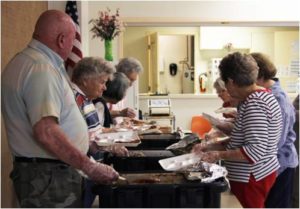The Forgotten Generation
by Jadi Chapman, Texas Hunger Initiative
If I were greeted everywhere the same way I am greeted when I walk through the doors of Harrison Senior Center life would be a joy. As I enter the senior center every week I am greeted with warmth, love, and a lot of hugs. I sit and talk with the senior citizens as they eat their lunch provided by Meals on Wheels. Every senior wants to tell me his or her story. They want to impart the wisdom they have gained from the Great Depression, the Great Wars, and illnesses that have befallen them and their loved ones. There are countless years of experience in the room, but as a senior shared with me, very few people want to listen to the knowledge gained from those experiences.
In most cultures the elderly are revered and respected. In Asian countries it is of the utmost importance to be respectful and to celebrate the elderly. In Latin culture it is commonplace for many generations to live together under one roof. The United States, however, is very youth-centric.
I had never really thought about issues that older Americans face. They gradually lose their independence as their health begins to fail and the symptoms of getting older set in. As I have gotten to speak with seniors over the past few months I have learned to admire and respect the beauty of aging. The seniors I spoke with are all so grateful and positive for what they have and the life they have lived.
 There doesn’t seem to be as much discussion or action around senior issues as there is around other social issues. It is hard to get people to rally around the aging population; people don’t see them as our future but as our past. Hunger among older Americans is something that can be forgotten when addressing food insecurity in the United States. Meals on Wheels serves 15 percent of the over half a million food insecure seniors in Texas. This leaves a substantial number of seniors wondering where their next meal will come from.
There doesn’t seem to be as much discussion or action around senior issues as there is around other social issues. It is hard to get people to rally around the aging population; people don’t see them as our future but as our past. Hunger among older Americans is something that can be forgotten when addressing food insecurity in the United States. Meals on Wheels serves 15 percent of the over half a million food insecure seniors in Texas. This leaves a substantial number of seniors wondering where their next meal will come from.
Because so many factors come into play when attempting to address senior hunger, it is an issue that is better addressed holistically. Some of these factors include:
- Financial insecurity
- Lack of transportation
- Special dietary needs
- Mental illness
Food insecurity among seniors is not simply a matter of not being able to afford to buy food. Sometimes seniors require specialized diets that are difficult to follow on a limited income. Metabolic illnesses, such as diabetes, impact what seniors are able to eat. Large supermarkets can also prove quite taxing for seniors. It takes a lot of energy to walk all over a large, crowded store when suffering from ailments such as arthritis, respiratory problems, or knee and hip replacements.
Alzheimer’s and Dementia can also have an impact on a senior’s nutrition. They may just forget to eat. Even if they have meals delivered, they may put the food in the fridge and then forget it is there. Many times the people who care for people with Alzheimer’s and dementia are seniors themselves. Sometimes these caretakers are so focused on the needs of the patient that they tend to neglect their own nutritional needs. When tackling senior hunger, it is important to approach the issue holistically. Mental, physical and emotional needs must be met in order to increase a senior person’s quality of life.
We were taught to respect our elders and look to them for wisdom, but American society tends to focus on our future instead of looking at our past to guide our future. May is Older Americans Month. Find a way to support the seniors in your community by donating your time to Meals and Wheels or Friends for Life, or by simply by helping the seniors in your community.
 This Act Locally blog post is by Jadi Chapman. She is a Field Organizer at Texas Hunger Initiative’s Waco Regional Office. Her focus is on issues facing seniors accessing food in the Waco community. If you would be interested in writing for the Act Locally Waco blog, please contact ashleyt@actlocallywaco.org.
This Act Locally blog post is by Jadi Chapman. She is a Field Organizer at Texas Hunger Initiative’s Waco Regional Office. Her focus is on issues facing seniors accessing food in the Waco community. If you would be interested in writing for the Act Locally Waco blog, please contact ashleyt@actlocallywaco.org.
.
